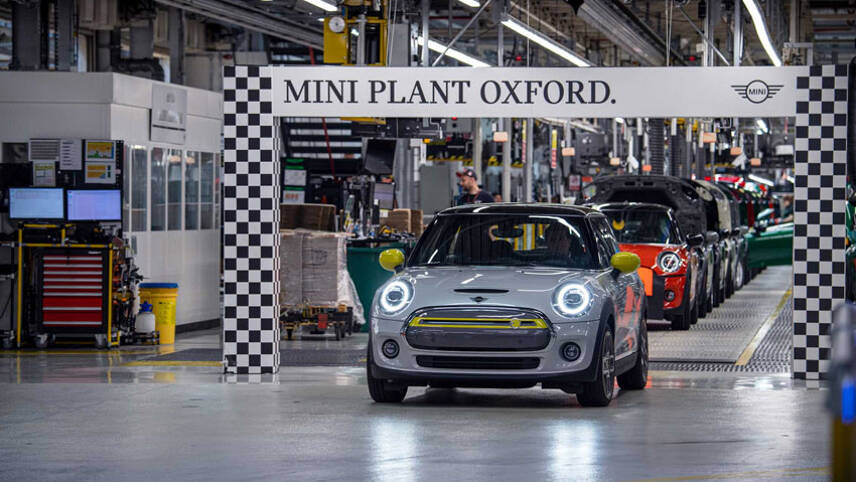Register for free and continue reading
Join our growing army of changemakers and get unlimited access to our premium content

Image: BMW
The Society of Motor Manufacturers and Traders (SMMT) has this week published a new manifesto for growing the EV industry rapidly in the coming years, delivering a tenfold increase in EV production to more than 750,000 vehicles per year by 2030.
This level of increase is consistent with the UK’s legally binding climate commitments and its ban on new diesel and petrol car and van sales from 2030. It would, the SMMT states, deliver some £106bn of economic benefit to scale EV manufacturing this rapidly.
This manifesto is, in part, intended to serve as a call to action for policymakers. The UK Government has been accused of squandering the EV opportunity by delaying the launch of subsidy packages to rival the US and EU; failing to guarantee affordable energy for manufacturers and not easing post-Brexit supply chain tensions.
The SMMT is concerned that things will only get worse once tariffs from tougher local content rules come into play later this year, under the recently-struck UK and EU Trade deal.
“We are in the middle of the most fiercely competitive investment landscape of a generation and need a UK response, urgently, using every policy, every fiscal and regulatory lever, to make Britain the most attractive place to invest,” said SMMT chief executive Mike Hawes.
Top of the organisation’s manifesto is a call for the Government to publish a comprehensive ‘Green Automotive Transformation Strategy’, setting out policies to mobilise investment into EV and parts manufacturing within the UK. Investment needs to be eased for smaller firms as well as bigger players.
The SMMT wants the plan to include robust policies to secure access to tariff-free exports for British-made EVs, parts and related technologies.
It should also include measures to ensure that automotive manufacturing and other industries deemed “critical” to the UK’s net-zero transition can access internationally cost-competitive energy. Four in ten UK-based manufactuers have seen their electricity bills double since the price crisis began and three in ten have recorded at least a doubling of gas bills.
Labour has been increasingly vocal about the Conservatives’ failure to bring forward a comprehensive new industrial strategy this Parliament.
Affordability and education
The Green Automotive Transformational Strategy, the SMMT states, should include plans to upskill and reskill workers – or the investment will have nowhere to go.
The body is calling on the Government to set up a “one-stop-shop” for upskilling in the form of a national hub. It also wants to see a re-assessment of how STEM subjects are positioned in curriculums.
Additionally floated in the manifesto are changes to immigration policies, making it easier for professionals skilled in EV development and manufacturing to move to the UK. One in five manufacturing workers in the UK are immigrants, according to official government figures.
As well as addressing the affordability of energy to manufacturers, the manifesto also calls on the Government to ensure EVs are affordable and accessible to the general public. This has been a particular concern since Ministers made two consecutive cuts to packages helping people with the upfront cost of EVs last year.
While the SMMT has accepted the Government’s decision here, it wants Ministers to take a broader look at measures to ”ensure that no-one is left behind in the transition to net-zero mobility”.
It recommends binding targets to ensure charging infrastructure is available everywhere, is reliable, and is affordable. A national EV Infrastructure Strategy set out last year set the ball rolling for work in this field, with the Government pledging £1.3bn for charging infrastructure.
The SMMT is describing its manifesto as a “challenge to all political parties” ahead of the next general election, which is likely to take place in 2024.
The Business and Trade Committee recently concluded an inquiry into the UK’s measures to scale EV manufacturing in the UK, with a focus on batteries. This was launched following the collapse of Britishvolt. Conclusions are due out later this year.
Apply now for the edie Net-Zero Awards
Readers interested in the above article may be keen to enter edie’s new Net-Zero Awards.
From breakthrough innovations and solutions through to industry-leading carbon reduction programmes and bold collaborative initiatives – this is THE awards scheme have your net-zero efforts and achievements recognised by thousands of businesses and climate experts.
The Net-Zero Awards have been launched as a sister scheme to the long-running edie Awards in response to the surge of innovation and corporate action to accelerate the net-zero transition. The Awards are open to all organisations across the public and private sectors and of all sizes from the largest multi-nationals to the smallest micro-businesses. Winning an inaugural Net-Zero Award empowers teams, inspires stakeholders and ultimately accelerates the corporate net-zero transition.
Applications are open until 14 July and awards will be presented on 15 November.
Click here for full information and to apply.


Please login or Register to leave a comment.